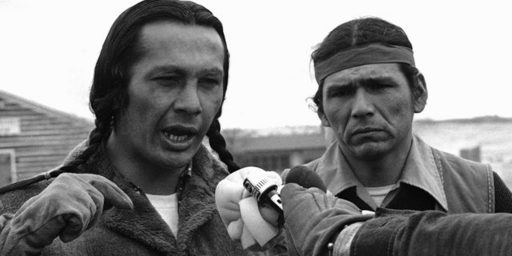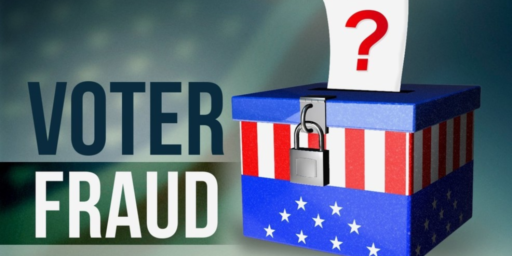More on the USAs and the Voter Fraud Question
Cross-posted from PoliBlog:
Via the LAT, Minnesota case fits pattern in U.S. attorneys flap:
A hint at why Heffelfinger’s name was on termination lists that Justice Department officials and Bush political strategists put together emerged when Monica M. Goodling, the department’s former White House liaison, testified last week before the House Judiciary Committee about the firings.
Goodling said she had heard Heffelfinger criticized for “spending an excessive amount of time” on Native American issues.
Her comment caused bewilderment and anger among the former U.S. attorney’s supporters in Minnesota. And Heffelfinger said it was “shameful” if the time he spent on the problems of Native Americans had landed him in trouble with his superiors in Washington.
But newly obtained documents and interviews with government officials suggest that what displeased some of his superiors and GOP politicians was narrower and more politically charged — his actions on Indian voting.
About three months after Heffelfinger’s office raised the issue of tribal ID cards and nonreservation Indians in an October 2004 memo, his name appeared on a list of U.S. attorneys singled out for possible firing.
The evidence continues to mount that what was going on with the US Attorney firings and maneuverings was to try and use the offices to create electoral advantages for Republicans. That is simply wrong and is the kind of thing that happens when partisan political concerns begin to outweigh the fact that what administrations are supposed to do is govern once in office, not simply worry about how one’s party will win the next election.
We keep coming back to this issue of voter fraud–indeed, a few weeks back I noted that at least half of the USAs targeted for replacement had been criticized for not going after enough voter fraud cases. It is important to understand that “voter fraud” is almost always an phrase used by Republicans concerned about a situation that affects them, just as Democrats tend to worry about “voter suppression.” I think that part of the reason that a lot of folks don’t think that there is an issue here is that who wouldn’t want to stop voter fraud? However, if the issue is about helping one party to the detriment of the other, we aren’t talking about a crusade to help democracy, we are talking about abuse of power.
Clearly the political arm of the White House (i.e., Rove and company) thought that they needed to use the law enforcement mechanisms of the US government to root out problems that might be adversely effecting the GOP at the ballot box. For example:
Suspicion of Indian voter fraud was strong among Republicans in the upper Midwest in advance of the 2004 election. The GOP blamed what it said was fraud on Indian reservations for the narrow victory of South Dakota Democratic Sen. Tim Johnson over Republican candidate John Thune in 2002.
Part of the problem, of course, is that suspicions are one thing while evidence that would warrant legal action is quite another. Indeed, if there were serious voter fraud problems out there, they should be pursued and prosecuted. The problem however, is that to date the evidence of a pervasive voter fraud is scant (also here). And, it should be noted, this lack of evidence occurs in the context of an active push by the administration to find it. (Also see Josh Marshall for more on the fraud issue.)
Ultimately there are two ways that voter fraud could be pursued. One is to pursue it in the face of evidence and to do so because it is a crime and it damages democracy. Another way is to pursue voter fraud because one thinks it is damaging one’s own party and therefore one tries to use the law enforcement mechanism of the government to try and find advantages for one’s own party.
The former is good and virtuous, the latter is not.
As a side note, Feffelfinger’s replacement, Rachel Paulose, has been in the news recently over charges that she is in over her head. See here.
An irony here is that according to the above-cited LAT piece, and Monica Goodling’s testimony, Paulose was chosen at least in part for ideological reasons:
On his way out, Heffelfinger recommended that Joan Humes, the No. 2 person in the office, be named interim U.S. attorney. But Humes was rejected by the Justice Department — in part, Goodling testified, because she was known to be a “liberal.”
The job went to a conservative Justice Department employee, Rachel Paulose. She had Ivy League credentials, brief experience as a prosecutor, and as a private lawyer had helped bring election lawsuits on behalf of the Minnesota GOP. She declined to comment for this article.
Now, that the Bush administration would want a “conservative” rather than a “liberal” in the slot makes perfect sense and is hardly sinister. However, what the overall situation continually seems to indicate is that the ideological/political dimension was paramount with the whole qualifications dimension being rather secondary, if not tertiary. It is, after all, possible to hire persons who are both ideological compatible with the administration and qualified for the job–yet, that doesn’t appear to be a priority.
The ultimate problem seems to be that the goal in this whole USA affair has been to help find ways for Republicans to win office in the future, without recognizing that the point of winning elections in the first place is to run the government for a set amount of time. Indeed, it often seems that politicians are so fixated on the next election that they forget why we have the elections in the first place.






Well, it’s hard to find evidence when the primary entity capable of & responsible for finding such evidence (DOJ, specifically the voter rights dept) was one of the first places the Bush admin clear-cut competent professionals from & re-seeded with political hacks whose only agenda was to prop up GOP strength regardless of quaint things like “laws”. Given that this is pretty-well confirmed by recent findings & testimony, your second sentence there is rather mystifying… The ‘active push’ was clearly one of suppression, not investigation.
That said, I agree with your main point; even more strenuously. This administration has engaged in nothing less that a deliberate, systematic subversion of the entire basis of a free democratic society – eliminating the entire possibility of free elections. Polite words cannot describe the fate these traitors (and I choose that word specifically) deserve.
Ultimately there are two ways that voter fraud could be pursued. One is to pursue it in the face of evidence and to do so because it is a crime and it damages democracy. Another way is to pursue voter fraud because one thinks it is damaging one’s own party and therefore one tries to use the law enforcement mechanism of the government to try and find advantages for one’s own party.
I’ll be honest: I don’t care whether the reasons someone pursues voter fraud are virtuous are not. All I care about is eliminating the fraud, regardless of which party it helps. As for evidence of fraud, well, some of it actually appeared in the dead tree papers during the 2004 season. Like the fact that some people admitted to being registered in both New York and Florida, and planned to vote in both (I would assume that one would have to be via absentee ballot).
One more thing: if someone thinks that eliminating voter fraud is likely to help him/her in upcoming elections, why is that not virtuous? Is it more virtuous to allow honest votes to become diluted by fraudulent ones? I don’t really understand that statement at all.
Now do I think that firing the USAs for political reasons is wrong? Frankly, I kind of lost my ability for outrage on this issue back in 1993 when all of them were fired. There were several indications that some of those dismissals were highly questionable as well. But regardless of the reasons that Bush or Clinton fired them, USAs serve at the pleasure of the sitting president, meaning they can be fired for preferring Pepsi over Coke, or something equally stupid. The point being that unless there’s evidence that’s more than circumstantial, the whole dustup is sound with no actual fury.
Just my opinion, of course.
I don’t think you quite get it:
The White House was neither pursuing voter fraud because it was a crime, nor because it was damaging their party. Instead, it is a reasonable assumption that the White House was pursuing “alleged” voter fraud in an attempt to suppress voting. (This because Republicans know that the fewer people that vote, the better their odds of winning.)
I say “alleged,” because if voter fraud actually existed in any serious way then the DOJ definitely should pursue it. But the definitive report on voter fraud, by the US Election Assistance Commission found there is
Fired USA’s McKay and Iglesias both indicate that they believe that the real reason they were fire was because they failed to cooperate with White House directives to pursue bogus voter fraud cases.
Garth,
I would put what you describe in the second category. Indeed, I linked to two other posts that note that there hasn’t been any real voter fraud to pursue.
So, while I may not have been clear, I agree with your basic assessment.
Steve, so what you are saying is those dead people who voted in Washington States Governor election does not constitute voter fraud? That double voting in Ohio is not voter fraud? Why is it Steve, that voter fraud always benefits Democrats? Is it because your parties quest for power is so important that honesty is not longer an issue? Remember Chicago 1960?
Steven,
Excellent post that sums the issue up nicely. I’ve got to say that the claims that you don’t care about voter fraud are willfully ignorant of the content of your argument.
To those who make such insinuations, if you’re not purposefully misconstruing what has been said here, the issue isn’t that anyone think’s it’s wrong to pursue voter fraud claims. The problem is that prosecuting “voter fraud,” as it’s borne out in practice, has really entailed suppressing votes that favor one party over another (often minority votes, but not necessarily always). The term, as I suspect most if not all of you know, is really dog-whistle politics, and ends up meaning that voters who may well not be committing fraud become disenfranchised.
Like Steven said, if there is evidence of such fraud, the perpetrators should be prosecuted to the fullest extent of the law. In these cases, there has, after an exhaustive search, been scant evidence of any real claims. This is called malicious prosecution, and may in and of itself be a crime. In any case, it is certainly against the very principles of justice to wield the US Attorney power like a partisan cudgel, and this is precisely why we have a scandal.
Ask yourselves this, if you turn “voter fraud” into “voter suppression” and exchange Bush for Clinton, if the same thing had happened in 1998, would you feel so prosaic about these events?
Yes, but Billy, they did not happen in 1998.
That’s the point isn’t it.
Now do I think that firing the USAs for political reasons is wrong? Frankly, I kind of lost my ability for outrage on this issue back in 1993 when all of them were fired. There were several indications that some of those dismissals were highly questionable as well. But regardless of the reasons that Bush or Clinton fired them, USAs serve at the pleasure of the sitting president, meaning they can be fired for preferring Pepsi over Coke, or something equally stupid.
Physics Geek, let me spell out the difference for you between the systematic replacement of attorneys at the end of a term, vs. the selective targeting of attorneys in the middle.
Clinton “fired” all the U.S. attorneys in 1993 only in the sense that their terms from Bush I expired and he chose not to renew them. Like Reagan did in 1980 with Carter, and like is absolutely typical when administration offices change parties. When you fill all the offices with your own people at the start of your term, that can’t be used to intimidate people into endorsing unlawful behavior. That’s par for the course.
When you fire supposedly non-political appointments in the middle of the term, and the people on the inside know it was because they wouldn’t consent to illegal behavior, then you intimidate everyone else into endorsing illegal behavior in a way that no mass firing could ever do. In a mass firing, there is no punishment for a specific position on a specific issue.
(This because Republicans know that the fewer people that vote, the better their odds of winning.)
Like, I suppose, the 2004 election, in which the record turnout resulted in both a Kerry presidency and a Democrat controlled House and Senate.
Try again. Try harder.